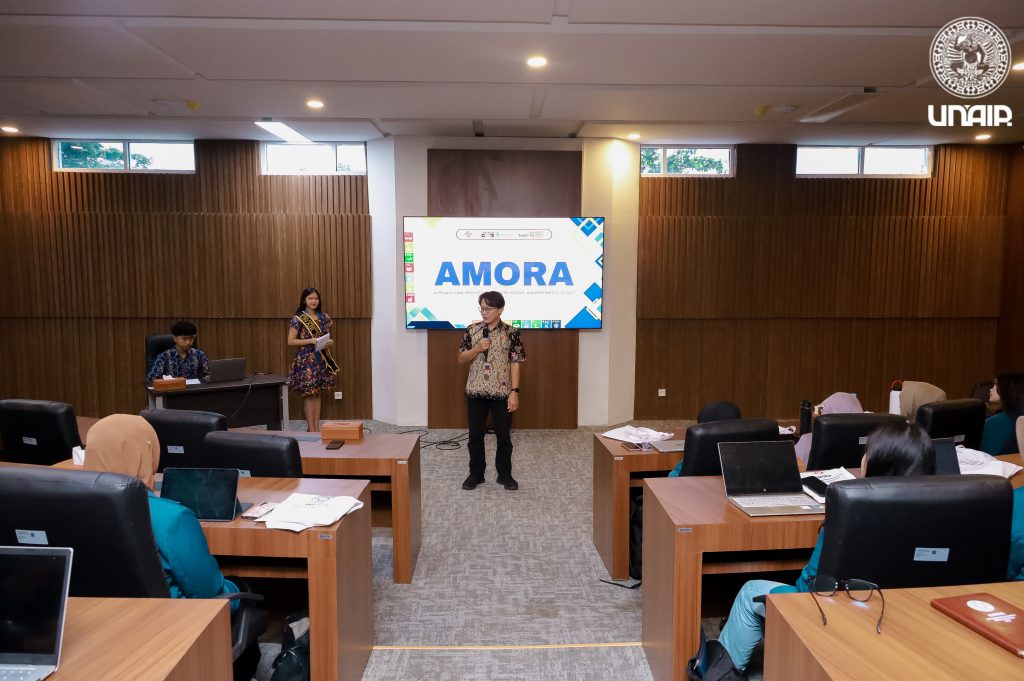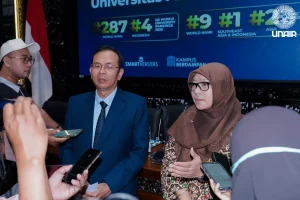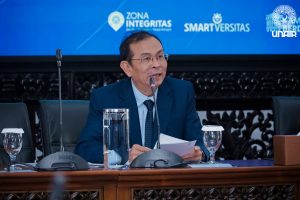UNAIR NEWS – The achievement of the Sustainable Development Goals (SDGs) depends on strong collaboration and partnerships. This point was emphasized by Ahmad Safril Mubah, S.IP., M.Hub.Int., Ph.D., during the AMORA Airlangga Movement for SDGs Awareness event—a joint initiative between the Airlangga SDGs School and SDGs Ambassadors 2025. Hosted by Universitas Airlangga’s SDGs Center, the event took place on Wednesday (May 14, 2025), at the Bayu Kinara Room in the Airlangga Convention Center.
Dr. Ahmad Safril Mubah, a faculty member of the Department of Social and Political Sciences, stressed that resolving today’s complex issues is nearly impossible without cooperation. “Cross-sector collaboration enables us to tackle interconnected challenges,” he noted, pointing out that most problems are interrelated and require a holistic approach.
He also clarified the distinction between collaboration and partnership. While collaboration can be informal, partnerships involve formal agreements and written commitments. “Anyone can collaborate, but partnerships require formal contracts and binding rules,” he explained. “Collaboration, on the other hand, can occur even without written agreements.”
Building partnerships at UNAIR
Mubah highlighted the SDGs Center at UNAIR as a model of institutional collaboration and partnership, especially through its work with Bappenas, Indonesia’s national development agency. He explained that UNAIR is committed to supporting the SDGs, which are targeted for achievement by 2030. Both UNAIR and Bappenas share the belief that collaboration and partnerships are essential to meeting these global objectives.
“We all agree that the SDGs can only be achieved through cooperative efforts,” he emphasized.
To help meet these goals, the SDGs Center also partners with students to carry out a variety of programs. Mubah explained that these initiatives would not be possible without collaboration between students and faculty.
“There are skills I bring to the table that you may not have, and there are abilities you possess that I lack. Let’s combine our strengths for collective progress,” he encouraged.
In addition to internal collaboration, Mubah noted that UNAIR has established partnerships with numerous external stakeholders—including domestic and international universities, local governments, and NGOs. He expressed optimism about expanding these partnerships even further.
“In the future, we aim to collaborate with an even broader range of partners,” he said.
Empowering student participation
Mubah urged students to engage actively in partnerships and collaborations that support the SDGs. He encouraged them to use forums, seminars, and discussions to advocate for sustainable development issues. Student voices, he said, play a crucial role in influencing policies aligned with SDG objectives.
“Let’s collaborate—raise your voice on SDG issues and support our collective initiatives,” he said.
He also encouraged students to take part in direct community involvement through volunteer work, service programs, and social action. Mubah noted that collaboration is critical in these efforts because communities are composed of various local groups. Students, he said, should work alongside these groups to empower communities.
“When you go into the field, collaboration is always part of the process—you never go it alone,” he remarked.
He added that students can also make meaningful contributions by joining local, national, or global organizations that focus on SDG-related issues. Through these platforms, students can play an active role in advancing sustainable development goals.
“Use your time as students to build connections and collaborate,” he urged.
Hands-on collaboration experience
During an interactive session, students practiced how to effectively persuade others to collaborate. Divided into groups, they were tasked with pitching program proposals to a simulated group of investors. The exercise aimed to build students’ communication and negotiation skills in real-world scenarios.
Participants shared that the session helped them go beyond simply writing down ideas, allowing them to develop the confidence to present and advocate for their proposals. The activity also helped them grasp the real-world importance of partnerships.
“This experience taught us how to approach others for collaboration so that we can achieve our goals,” said one student participant.
Author: Septy Dwi Bahari Putri
Editor: Khefti Al Mawalia









